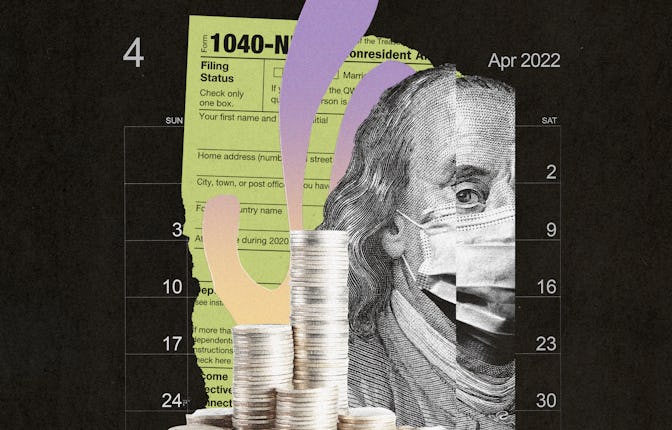What to do if you haven't paid your taxes during the pandemic
Step one: Don’t panic.

During the height of the pandemic, doing daily life things felt hard for some of us, and tackling big projects was nearly impossible. As we peek back out into the world, it can be overwhelming, especially when it’s suddenly tax season. Another alarming realization, if you haven’t paid taxes at all during the pandemic, is that it is now the year 2022. We’re nearing the tax deadline (which hasn’t been delayed this year) but don’t panic because we talked to experts about how to get your files in order.
“The first step is just deciding to do it,” says Carlos Samaniego, an enrolled agent in Redlands, CA. An enrolled agent, if you’re wondering. is an IRS-certified tax pro. “Most people do not make that decision until they have wiped their bank account out through a bank levy or they have the embarrassment of their employer telling them they have to garnish their wages for the IRS.” Basically, if the IRS isn’t up in your DMs, relax and get to work secure in the knowledge that many Americans have been procrastinating even longer than you have.
The next step is figuring out which years you need to file taxes for, explains Brad Biren, a tax law attorney in Des Moines. “Your 2021, taxes are not due yet, so that means you need to file for either/and/both years 2019 and 2020.” That may sound obvious, but I had actually forgotten that I don’t have to deal with 2021 taxes until April. If you don’t know which years you owe for, the IRS has an online account set up for you where you can see all your past returns.
In case you’re wondering if you can file an extension for the years you forgot to file, the answer is a resounding no. “The extension gives you an extra six months for the current year's filing — in this case 2021,” says Biren, but not taxes past due. But if you don’t have your shit together by April, you can file for an extension for 2021 even if you haven’t paid for past years yet. In case you’re paranoid that filing an extension for this year will alert the IRS about your tardy taxes, don’t be. “Go ahead, it raises no eyebrows,” says Biren. “File an extension with glee!”
Once you’ve figured out what years you need to file for, it’s time to gather your paperwork. So, if you’re like me, you might have misplaced those very important documents, though. “Losing paperwork from employers is common,” Biren says. “You can call your employers for copies.” Also, anyone who has paid you taxable income has (hopefully) reported it to the IRS, and you can request a transcript of your W-2s and 1099s on your online account.
Pro tip: There’s an IRS office in most cities with people who can help you. “You can ask the professional at the IRS assistance office to help you search through employer withholding documents, such as W-2s,” Biren says. “Honestly, you can go there with a trash bag of records and receipts and they will cobble together a filing for you for free.” Free!
After you’ve got all your paperwork together, it’s time to file. Obviously there are a million online options, but you can also print out a paper copy if you want. Most people just need to fill out the standard 1040 form, says Biren. And, he adds, don’t worry about messing up because if you do, you can file an amended form later.
What about the money part of paying taxes? “If your fear is paying penalties, just know other than several late fees, you only owe penalties on taxes owed,” Biren says. It may not be as bad as you think, though. One year I thought I was going to owe thousands and I ended up with a very modest $140 bill. Nbd. Plus, it’s always possible that you will get a return by filing, even late. “The federal government could owe you money!” says Biren. Why not find out?
“You can go there with a trash bag of records and receipts and they will cobble together a filing for you for free.” Free!
If all of this feels like a lot and you can’t handle it all, you can hire a pro. And you can deduct the costs of filing services, up to $250 per year, says Biren. You can even hire someone after you’ve already filed. “Pay a professional to review your records from those years to find hidden cash,” says Biren. “See what incredible deductions and credits you may have been eligible for in those years.” That sounds almost, well, like the government might have some free money waiting for me.
Whatever you do, don’t just not file your taxes. “Even if you cannot pay the tax bill, at least file the tax return,” says Samaniego. “You cannot go to jail for owing the IRS money.” You can, however, go to jail for not filing. “Most people do not realize Wesley Snipes went to jail for the non-filing of three years of tax returns,” Samniego says. Um, no, I did not know that. I thought he went to jail for some baller shit that I don’t understand.
You may feel like whatever you make is peanuts in comparison to Snipes, but Samaniego cautions against that false sense of security. “The IRS has made a no initiative that started last June to look for non-filers and the plan on even doing house calls to non-filers looking for past due returns,” says Samaniego. “There has been no better time for non-filer and people with tax problems to reach to solve their tax problems.”